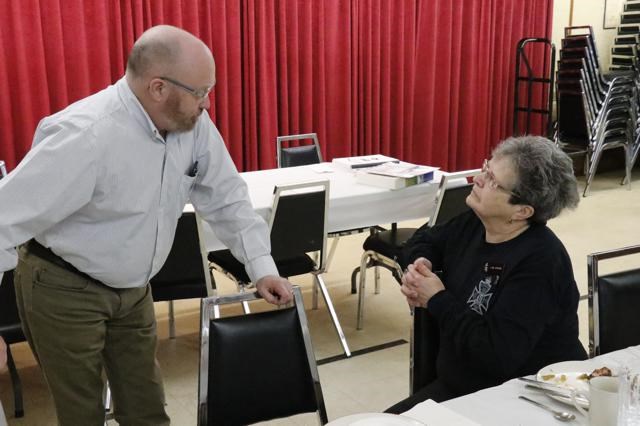By Greg Nikkel
Tracking down obscure family information takes good detective work, a genealogist told the Weyburn Rotary Club on Thursday in a presentation from the Weyburn chapter of the Saskatchewan Genealogy Society.
“Genealogy can be an adventure into the unknown,” said Ilene Johnston, president of the local chapter, as she explained why she is involved with the pursuit of family roots, and how people can look into doing the same.
Her interest in genealogy began when she was in high school. Her family arrived in Weyburn in the late 1970s, and she worked as a staff member for Southeast Regional Library. In chasing her interest, Ilene took training and became a certified Canadian researcher in genealogy.
She noted that the Weyburn Public Library, where they meet on the second Tuesday of each month, has many resources people can use, including a reference library, microfilm collection of historical census records, and CDs of information that they make available for sale.
The reference library includes how-to books for doing family research, history books, atlases, directories, phone books, cemetery inscriptions, and indexes.
The microfilm collection includes the census of Manitoba for 1831-1849 and 1870, the census of Canada for 1881, 1891, 1901 and 1911, a census of the prairie provinces from 1906, and issues of the Weyburn Review from 1922-32, 1943-61 and from 1980 to the present time.
Among the CDs is “Weyburn: From the Roots Up”, which is an index of assessed owners and properties in Weyburn from 1904 to 1920. There is also a CD of Weyburn-area photos which was compiled for Weyburn’s centennial as a city in 2013. Both CDs are available for $25 each, and the photo collection is available in book form for $90, while “From the Roots Up” is in book format for $300.
Ilene said those interested in doing family research can either try doing it on their own, through a website like Ancestry.ca, or join the genealogy society, and take advantage of the resources they have available. Sometimes surprising resources come to light when doing research, she said, such as the family records from one person whose grandfather was a surgeon in Scotland and immigrated to Canada on a ship. His diary had a narrative of the ship’s voyage and the people he took care of on the ship.
One project they are looking at doing is putting up signage for grave sites at Hillcrest of patients of the former Souris Valley/Weyburn Mental Hospital who died and are buried there without a marker.
At times, it takes a while to track down historical documents, said Ilene, noting she made a request for one in December 2016, and only recently she received it.
“Even though some of these records are digitized, sometimes you have to do it the old-fashioned way,” she said. “I would recommend doing your own research and not just use one website. No one website has everything.”
A recent “fad” has been a commercial advertising getting information through a DNA test, and she said, “They don’t tell you who you’re related to or how. It does help when you’ve met someone and you can’t find a connection. That way you can prove or disprove a relation, so it’s good in some way, but not in others.”
If a person joins a group like the genealogy society, they can do their own research. If information is found through a site like Ancestry.ca, it’s only accessible to someone who has a membership to that site, and isn’t available to just anyone. Facebook can be a valuable tool as it connects a person to others across the country or around the world, she said.
“There’s no charge to come to a meeting and see what we have to offer,” said Ilene.
Through the research that she has done in genealogy, she has been able to find out things related to her family history that she never would have known otherwise.
“I was fortunate enough to visit a house of an ancestor of mine in 2012 in Ireland. The lady there was 85 years old, and she was able to tell me things about my relatives who lived there,” said Ilene, adding she was also able to retrace the route taken by a relative who was a member of the Regina Rifles in 1944 at the age of 17, and died on D-Day on Juno Beach during the Second World War. She was also able to meet up with a former co-worker from the regional library who went back to England, and was able to give Ilene a tour of Yorkshire while she was there.
Asked if there was a way to store information so other people can access it, Ilene noted there are a variety of ways, such as donating historical material to the Sask. Genealogy Society or to Saskatchewan Archives, depending on how important the material is, or to a museum. “That’s a big question for us, namely who’s going to get our treasure?” Ilene asked.




